Django Admin or WordPress? Python or PHP? On what does the popularity of different programming languages depend? Is PHP still an important programming language?
What content management system (CMS) should you choose? Which programming language has a brighter, more promising, business-useful future? How much does it cost to create a website in WordPress or Django?
What kind of programmers is the market promoting, and what does this mean for business owners? What are the most popular programming languages?
Naturally, that depends on the point of view. Everything has advantages and disadvantages.
Perfect solutions don't exist. Each has its strong and weak points. Everything depends on the goal you want to achieve, the scale of a project, the industry, and the specific expectations of users. And so on.
All of that is true, but some objective processes shape the market and determine businesses. Although, customers aren't always aware of this.
Today, we'll discuss one such factor that strongly influences the shape of the market, opportunities, and limitations of customers of web development companies.
Let's start with a high C by saying that, to a large extent, the future of technology is determined not only by business customers or users of applications created in given technologies but also by developers themselves. The popularity of languages depends on developers' preferences.
A lot depends on programmers, who create these technologies, develop them, use them, and ultimately evaluate their job usefulness.
Their choices, a keen sense of market needs, and assessment of the value of a given technology and its job value influence how a given technology is seen.
Regarding the attractiveness (functional, business, professional) of programming languages, opinion leaders are mostly the developers themselves.
What opportunities for career growth and what challenges a given technology offers also depend mainly on how programmers will react to it.
Their choices regarding education, career, and whether they consider a given technology to be promising and worth the effort determine the development opportunities for web and mobile applications and their customers.
So, let's look at the dependencies that can be observed in the job market for programmers and consider the consequences that result from or can result from these dependencies in the near future.
We invite you to read on!
What is the purpose of WordPress and Django Admin?
Before we try to settle which one of the content management systems is more forward-looking, we need to start from the very beginning. We need to begin with the intentions that guided the developers of these tools.
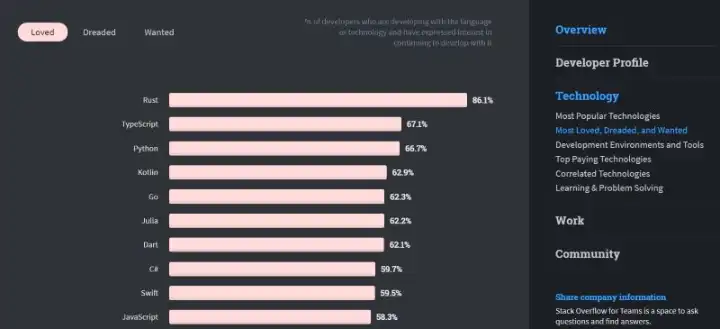
The history of WordPress is inseparably connected to the history of the creation and development of the blogosphere.
The massive flood of blogs has made a simple-to-use, not-requiring-programming-competence tool adequate and recommended for small, amateur publications perfect for its time.
For WordPress laymen, it became the synonym of a CMS. Of a blog. Of a website.
And it's not surprising.
WordPress is a perfect solution for novice companies with a small range and with typical needs who look for typical solutions and functionalities.
It can handle uncomplicated expectations and deliver solutions that solve basic business problems.
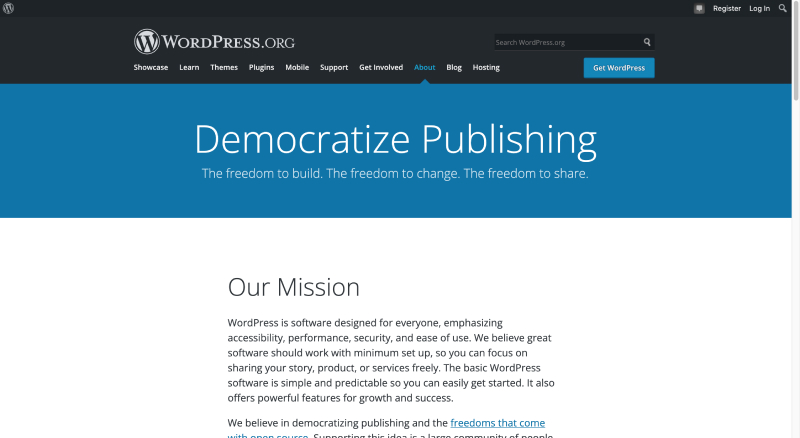
While WordPress continues to be developed, it has expanded little beyond its original function.
Naturally, WordPress offers many plug-ins that extend its capabilities. However, in practice, this means adapting them to individual needs, continuously controlling their stability, and trusting that their installation won't lower the data security level.
At some point, a website built on WordPress starts to resemble a mud hut and not an elegant house designed by a professional architect.
In the case of WordPress and projects that are much larger, more complex, and serve to achieve complex business goals, the theory is starting to be at odds with the practice.
The statement that WordPress is equally good as other solutions is only a half-truth.
WordPress requires continuous effort and attention, which can be avoided by using competitive solutions.
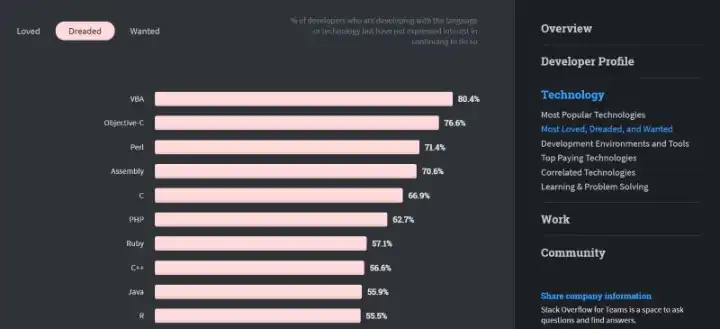
The situation looks different when we look at the Django framework, which offers a content management system.
From the beginning, it was designed as a tool to achieve complex business goals quickly, simply, effectively, and safely.
Its origins, history, present, and future clearly indicate that it is a tool for solving less common and complex problems.
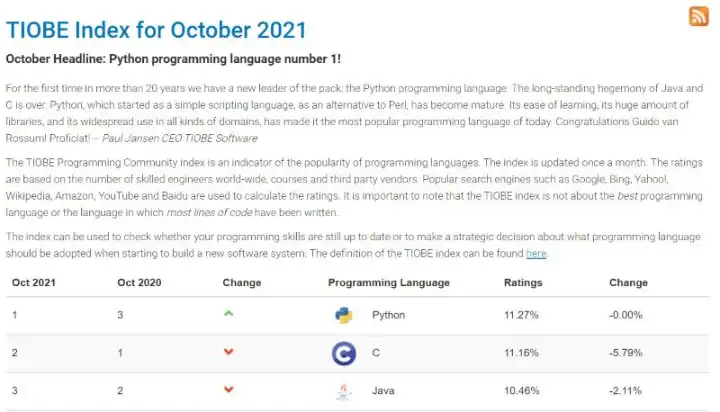
It's a tool that helps create much more stable and secure applications with fewer resources in a much shorter time.
PHP vs. Django
When discussing WordPress and Django, it's worth noting the difference between these two terms. PHP is a server-side programming language commonly used to create dynamic web pages through a PHP script. Django, on the other hand, is a popular web framework written in Python programming language.
PHP advantages:
- Easy to learn
- Simplifies testing (error-free testing environment)
- Improves SEO ranking by loading web pages faster
- Comes with ready-to-use codes (scripts)
- Provides database support
- Can be run on many platforms, including Linux, macOS, Windows
PHP disadvantages:
- Requires the use of an interpreter program to interpret codes
- Lacks uniformity, which increases the cost of hiring new human resources
- The need to install add-ons to better user experience, which may impact the speed of a site
Django advantages:
- Faster development time
- Scalability
- A better choice for creating custom software
- Delivers secure websites
- Makes use of machine learning
- Python code is concise and easy to read
Django disadvantages:
- It is not an ideal choice for small projects because of its code-intensive nature
- Can process only one request at a time
- Due to its monolithic structure, it doesn't provide a lot of freedom in terms of development
WordPress and Django through the eyes of a programmer
From a developer's perspective, the Django framework is a tool that allows them to develop professionally. It gives them many more opportunities and professional satisfaction.
WordPress, and we say that with respect for its creators, is a much less demanding tool and is considered a good tool at the start of a career.

A tool that helps acquire first skills and which quickly will stop being a challenge. The attitude of developers isn't meaningless.
After a while spent with WordPress, the most ambitious, development-oriented, and thus the most useful for a company, specialists start to look for new challenges.
And this means that the market for programmers dealing with WordPress is a market for aspiring developers rather than specialists.
Another market indicator also illustrates this regularity, namely the salary of developers using PHP vs. Programmers specialized in Python.
As you can easily guess, the most popular programming language will be the one that provides higher salaries and better development opportunities in the short and long term.
Hourly rates, project rates, and monthly average earnings offered in both domains clearly show the insane difference. We'll discuss salaries in detail in a moment.
What are the most popular job offers, or which developers the market seeks?
While browsing through platforms aggregating job offers (e.g., Indeed.com under the keywords Python and PHP developer) and articles in a trade press, while following discussions on forums, an image emerges that sheds light on our problem from yet another perspective.
For many years, the most desired skills include knowledge of Python, JavaScript, and Java. These are the most popular programming languages.
Year after year, the number of job offers in which companies look for programmers familiar with PHP decreases. Instead, the number of offers in which programmers specialized in Python are sought by employers increases.
The popularity of languages is best expressed by an objective indicator such as the number of job offers. Employers don't only look for a developer but also a business-useful programming language.

Customers also change, although not as quickly as would be desirable. Clients of web development companies are increasingly more aware and demanding.
They increasingly move away from a programming language that, with time, becomes inconvenient and problematic.
So, it's unsurprising that Python is currently the most popular language for designing complex websites.
Owners of companies that develop software also focus on the competencies, development, capabilities, and usefulness of a given expert in the long term.
They will more eagerly employ a Python developer than PHP.
For a simple reason. It's much more profitable business-wise. That said, it's not just about financial profit but also a strategy for stable company development.
Python is popular and liked by programmers and is increasingly often appreciated by clients. Python is a more rational, safe, and forward-looking choice for companies developing software and their clients. It's just profitable.
What does that mean for a company trying to settle the dilemma of Django vs. WordPress?
It means that the development of a product may be difficult because of the following:
- Big rotation of developers in companies specializing in WordPress and PHP
- Overrepresentation of programmers with less experience
- The need to look for competent developers more often
- Inadequacy of technology itself to more complex projects, which, with every subsequent modification, adaptation, and expansion, becomes increasingly more problematic in terms of its scalability, security, and speed of adaptation.
The evolution of the salary of PHP and Python (Django) developers
Trends, which were described above, are perfectly resembled in salaries. And salaries are a perfect measure of value, desirability, and attractiveness.
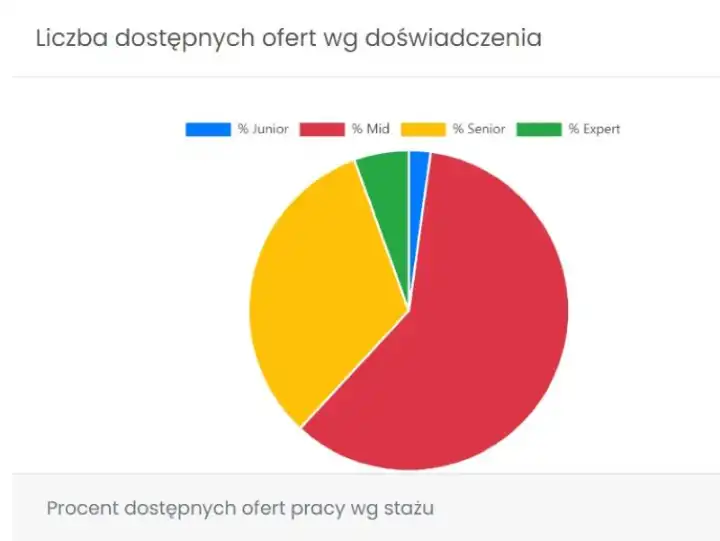
Like a lens, earnings aggregate all variables influencing how given competencies, skills, and experiences are seen and assessed.
Salaries also show how much can be gained by employing a given specialist. So, for owners of web development companies, they're a clear signal indicating what the market wants, what it bets on, and what it wants to pay for and for what it will continue to pay.
This, in turn, influences how easy or difficult it will be to develop a project with a given solution. In our case, the dilemma is between WordPress and Django content management systems.
Betting on PHP and WordPress in many cases, but not all, can get you in trouble in the future.
According to Indeed, as of April 2024, the salaries of PHP and Python developers in the United States look as follows.
A PHP developer earns:
- On average, $85,613 per year
- The lowest being $55,531 per year
- The highest being $131,990 per year
A Python developer earns:
- On average, $126,233 per year
- The lowest being $70,993 per year
- The highest being $224,458 per year
According to data, the differences concern not only the salary but also the availability of job offers, which significantly differ depending on experience and the level of specialization in a given programming language.
In the case of PHP developers, most jobs are offered to intermediate programmers. Seniors are twice as rarely sought after in the job market compared to less skilled people.
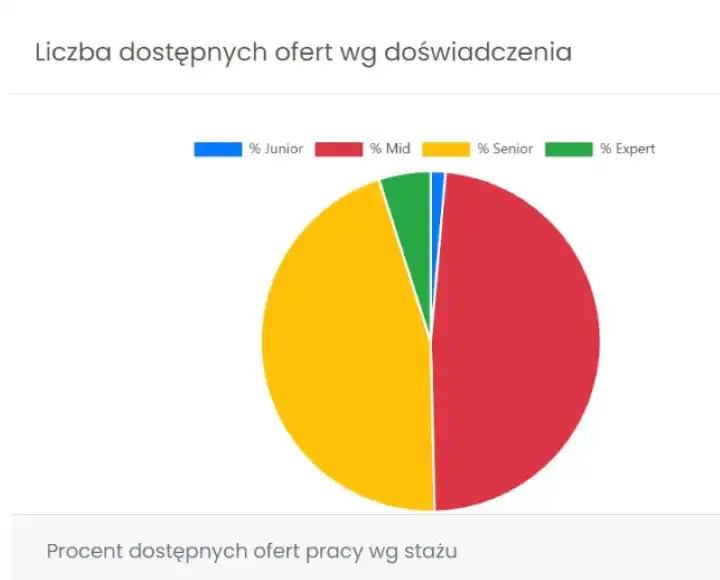
The job market for PHP programmers seems not to be interested in experience, skills, competencies, or knowledge. It appears not to focus on the quality and development of programmers. Instead, it promotes a state of continuous aspiring (being a wannabe).
Seniors in the job market for Python programmers are much more desirable. The number of job offers for seniors and intermediate specialists is more or less the same.
These trends clearly show the direction the most ambitious, capable, hard-working, and committed programmers will go.
The direction they will take should also be the direction of business owners. Because it's following a trend that has been going on for several years and will most likely continue.
This data suggests who and to what degree will be appreciated by companies and will be promoted by them in whom companies want to invest. Remember that an investment in an employee is simultaneously an investment in technology.
This translates into who (PHP vs. Python programmers) and with what (e.g., WordPress vs. Django) a company will compete in the market.
When examining the effectiveness of competing using such non-obvious indicators, you can probably see the trends that are forming in the market quite clearly.
These speak in favor of Python and frameworks built with it (such as Django).
Google Trends — the most popular programming languages
Since we're talking about trends, it would be nice to refer to one more indicator: search trends for given phrases in the Google browser.
Search trends show who and what the market is looking for, what programming languages are worth learning, and which ones are the future.
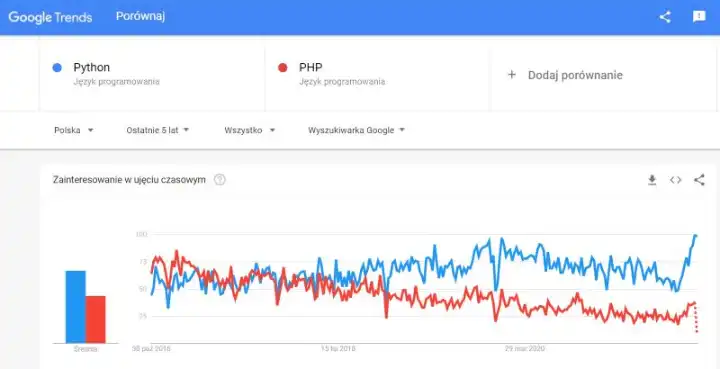
This market is broadly understood as a market of employers, employees, contractors, customers, future students, and people entering the labor market.
Although we don't have detailed data extracted using such criteria, it's safe to assume that in the long term (at least five years), these search trends will consist of queries generated by representatives of all these groups.
Also, according to Google's data, Python is a highly sought-after programming language. PHP, which is in retreat, isn't generating as much interest.
The most popular programming languages in any language version of the browser and any market are almost identical.
WordPress is still the most popular CMS globally, but it's worth noting here that this popularity also includes individual users who don't run any businesses, who make up a pretty significant number of WordPress users.
Django vs. WordPress. Programming languages. The job market for programmers. Summary
- The future of technology is determined not only by business customers and users of applications created in particular technologies but also by developers themselves.
- The attractiveness of a given technology largely depends on developers who create it, develop it, use it, and ultimately assess its job usefulness.
- The insiders' sense of the market's need and their assessment of the value of technology influences what business value a technology has and how it's perceived.
- The history of WordPress is the history of the creation and development of the blogosphere. For WordPress laymen, it became the synonym of a CMS, a blog, and a website.
- WordPress is a perfect tool for a company with a small range and typical problems that looks for typical solutions and functionalities.
- WordPress requires continuous effort and attention, which can be avoided by using competitive solutions.
- From the beginning, Django, which offers a content management system, was developed to achieve complex business goals quickly, simply, effectively, and safely. It is meant for building web applications that are scalable and can process large amounts of traffic.
- Django is a tool that allows developers to build much more stable and safe mobile or web apps. With Django, an MVP can be created much quicker with fewer resources.
- From a developer's perspective, Python and the Django framework are, respectively, a programming language and a tool. They offer much broader professional development and give developers much more opportunities and professional satisfaction. Unsurprisingly, they're among the most popular programming languages and tools.
- WordPress is a much less demanding and suitable tool for starting out.
- The most ambitious, development-oriented specialists (and thus the most desirable and useful for web development companies and their customers) look for new challenges after a while with WordPress.
- The market for programmers familiarized with WordPress is more of a market for aspiring developers rather than specialists.
- For many years, knowledge of Python, JavaScript, and Java technologies has been among the most sought-after skills worldwide.
- The number of job offers in which companies look for programmers familiar with PHP decreased. And the number of offers in which employers seek programmers specialized in Python increased.
- Clients of web development companies are increasingly more aware of the popularity of programming languages and are more demanding. Python is also among the most popular programming languages for them.
- Owners of companies that develop software also focus on the competencies, development, capabilities, and usefulness of a given expert in the long term.
- Like a lens, earnings aggregate all variables influencing how given competencies, skills, and experiences are seen and assessed.
- The job market for PHP programmers seems not to be interested in experience, skills, competencies, or knowledge.
- Seniors in the job market for Python programmers are much more desirable. The number of job offers for seniors and intermediate specialists is more or less the same.
- Trends speak in favor of Python and frameworks built with it (such as Django).
- Search trends show who and what the market is looking for.
- Search trends for a long time have indicated that Python is the programming language worth investing time and energy in.
- According to Google's data, Python attracts more interest from developers and customers as a programming language.
Disclaimer
The sample prices presented in the article do not constitute a commercial offer within the meaning of the Polish Civil Code.






